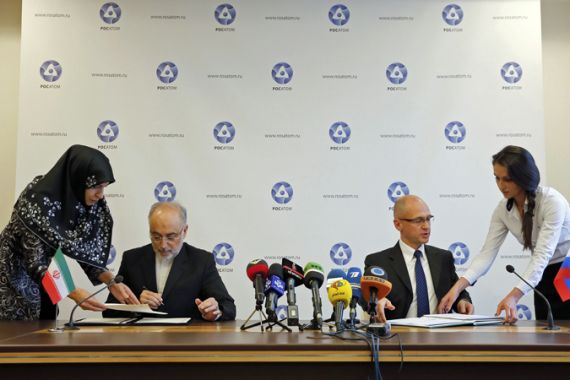Iran nuclear mediators hint at extended talks
Despite no breakthrough in Muscat, Western powers and Iran consider continuation of dialogue after November 24 deadline.

Iran and world powers have held more talks in Oman’s capital amid growing signs that a deal on Iran’s nuclear programme would be extended for the second time beyond a November 24 deadline.
The one-day meeting on Tuesday came after lengthy discussions between John Kerry, US secretary of state, and Mohammad Javad Zarif, Iran’s foreign minister, broke off in Muscat late on Monday with no signs of progress.
Tuesday’s talks between Iran’s nuclear negotiating team and officials from the P5+1 – the US, France, Britain, Russia and China, plus Germany – started at 07:45 GMT.
The discussions, headed by former EU foreign policy chief Catherine Ashton, were scheduled to brief the P5+1 members on Kerry and Zarif’s talks.
Iranian and US officials indicated on Monday that big obstacles stand in the way of a final agreement.
With no signs of a conclusive agreement being near, there are expectations the interim deal implemented last January would be extended again. This has already happened once – when a July 20 deadline was missed.
Despite the logjam, neither side has indicated it would walk away from the table.
The West still appears unconvinced of Iran’s assurances that it has not sought and would not attempt to develop an atomic bomb, while Iran wants clearer agreement on when sanctions would be lifted.
The US State Department said the head-to-head meetings – more than 10 hours across two days – proved “tough, direct and serious”, adding that “there is still time” for progress.
Candid remarks
Abbas Araqchi, Iran’s deputy foreign minister, quoted by state media, was more candid.
“To reach a result by November 24 is very difficult but we do not despair,” he said.
A US official said Kerry’s top principal negotiators, Wendy Sherman, under secretary of state, and Bill Burns, a former under secretary, would attend the P5+1 briefing which would also include technical experts on nuclear policy and sanctions.
Kerry, now in Beijing, would also speak to President Barack Obama as well as White House national security adviser Susan Rice about the talks with Zarif.
As the talks in Oman got under way, Iran indicated its intent to pursue bigger atomic plans, announcing a deal that would see Russia build two new nuclear reactors at the Bushehr plant in southern Iran, taking its total number of reactors to eight.
The P5+1 wants Iran to reduce the scope of its nuclear activities – in exchange for an easing of punitive economic sanctions imposed since 2012 which have blighted Iran’s economy.
Iran says its nuclear programme aims to produce atomic energy to reduce the country’s reliance on fossil fuels, but the West and Israel suspect the fuel could be enriched to produce a bomb.